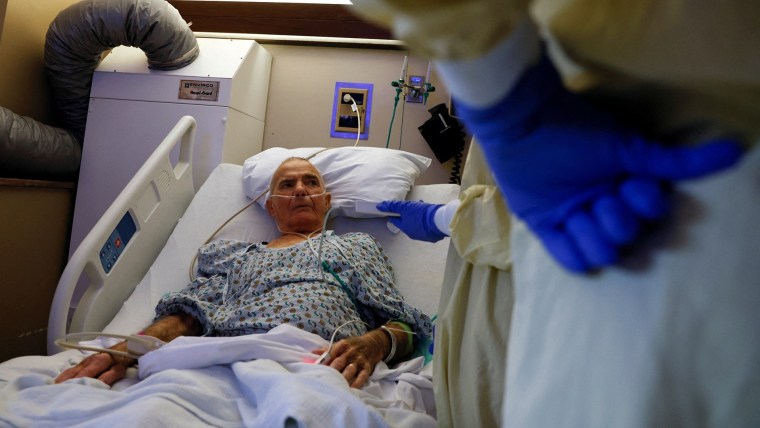Loss of smell is a warning sign of Alzheimer's. What if you lose your sense of smell from Covid?



One of the stranger symptoms of Covid — the loss of the sense of smell — is a symptom that, well before the pandemic, was considered to be a warning sign for dementia.
The big question for researchers now is whether Covid-related loss of smell might also be associated with cognitive decline. Around 5 percent of Covid patients worldwide — some 27 million people — have reported loss of smell lasting more than six months.
New preliminary findings presented Sunday at the Alzheimer's Association International Conference in San Diego suggest there may be a link, though experts caution that more research is needed.
Previousresearch has found that some Covid patients go on to develop cognitive impairment after their infection. In the new study — which has not been published in a peer-reviewed journal — researchers in Argentina found that loss of smell during Covid may be a stronger predictor of cognitive decline, regardless of severity of disease.
"Our data strongly suggest that adults over 60 years of age are more vulnerable to cognitive impairment post-Covid if they had a smell dysfunction, regardless of the severity of the Covid," said study co-author Gabriela Gonzalez-Aleman, a professor at Pontificia Universidad Catolica Argentina in Buenos Aires, adding that it's too soon to tell if the cognitive impairment is permanent.

What we know about long COVID: Symptoms, causes, conditions
The study tracked 766 adults ages 55 to 95 for a year after their infection. Nearly 90 percent had a confirmed case of Covid and all completed regular physical, cognitive and neuropsychiatric tests over the course of one year.
Two-thirds of those infected had some type of cognitive impairment at the end of that year. In half of the participants, the impairment was severe.
The researchers did not have hard data on the state of cognitive function of the patients before contracting Covid in order to compare with the findings at the end, but they did ask participants' families about their cognitive function before infection and did not include people who had clear cognitive impairment before the study.
According to Jonas Olofsson, a professor of psychology at the University of Stockholm who studies the link between sense of smell and dementia risk — and was not involved in the new research, smell loss is a well-established precursor of cognitive decline. It's also well established that Covid can lead to lasting loss of smell, he said.
"The question is whether those two lines of research intersect," Olofsson said. "This study is quite tantalizing, although the information that I have seen so far does not allow for any strong conclusions. "
The smell-brain connection
According to Dr. Claire Sexton, senior director of scientific programs and outreach at the Alzheimer's Association, "Loss of smell is a signal of an inflammatory response in the brain."
"We know inflammation is part of the neurodegenerative process in diseases like Alzheimer's," Sexton said. But we need to dig deeper into exactly how they are connected."
A separate study — not related to Covid — published last Thursday in the journal Alzheimer's & Dementia probes that connection further. Researchers at the University of Chicago found that not only can a decline in sense of smell over time predict loss of cognitive function, loss of the sense of smell can also be a warning sign of structural changes in regions of the brain important in Alzheimer's disease and dementia.
Using data from Rush University's Memory and Aging Project, the researchers tracked loss of smell in 515 older adults over 22 years. They also measured gray matter volume in parts of the brain that were related to dementia and those related to smell.
They found that people whose sense of smell declined faster over time ended up with smaller amounts of gray matter in both of these regions of the brain. The same was not true of parts of the brain tied to vision, suggesting sense of smell has a unique link to cognition in terms of structural differences.
"Not only can change in olfactory function over time predict the development of dementia, but it can also predict the size of those brain regions that are important," said study leader Dr. Jayant Pinto, director of Rhinology and Allergy at UChicago Medicine.
Smell 'critical' for cognition
Covid is not the first virus to cause loss of smell, but virus-related loss of smell was a rare occurrence prior to the pandemic, Pinto said. That means that it's only recently that scientists are able to conduct large studies on how smell loss caused by a virus may impact cognition.
"Sense of smell is extremely critical for cognition, especially for the brain to handle information about the environment. If you shut down that channel of communication with the brain, it will suffer," said Dr. Carlos Pardo, a professor of neurology at Johns Hopkins University, who was not involved with either study.
But whether Covid-related loss of smell can cause cognitive decline remains unclear.
"That's an open question -- does the injury to the olfactory system from SARS-CoV-2 result in problems not only in the olfactory system, but also in the brain itself?" Pinto said.
According to Olofsson, the olfactory system — the parts of the brain related to smell, including the olfactory bulb, the part of the brain that processes smell — connects to parts of the brain that process memory. While it's possible that Covid disrupts the olfactory bulb and then the brain deteriorates around it, Olofsson said this isn't likely.
"There are a number of other ways in which these two things can be related. The cause may be a pathology that is unrelated to the Covid effect," he said.
Or Covid may simply amplify existing loss of smell or cognitive decline that went unnoticed before the infection, Olofsson said. Patients may have already been experiencing some cognitive decline when they contracted Covid, or may have already had slight olfactory system impairment, which made them more susceptible to Covid-related smell loss.
"It could be that the olfactory function was maintained despite being atrophied, but when Covid came, it wiped it out," he said.
If it turns out that Covid smell loss can cause cognitive impairment, understanding the connection could help physicians intervene with loss of smell early and potentially prevent cognitive decline in high-risk people.
"We will be dealing with the endemic circulation of a virus that is not going away," Pardo said. "If we learn more ways how we are able to recover smell quickly, we may be able to minimize the damage that loss of smell may cause with cognitive issues in people who are susceptible."

Tags
Who is online
71 visitors

Like most of us I had Covid. I got my case back late February 2021 between my two vaccination doses. There is a case to be made that I caught Covid at the indoor vaccination site (a repurposed indoor sports site).
I lost my sense of taste and smell. They eventually recovered, although maybe not to 100 percent.
Covid itself was one of those respiratory viruses that starts in the nose and crawls down to your throat and then into your chest over the course of a few days. You can feel the irritation move inch by inch.
I think the damage is done directly to nerve endings in the sinuses and on the tongue and that the brain atrophy in Covid is due to a lack of sensory input. Alzheimers smelling sensation loss is due to the brain inflammation alone.
I said, "I think."
I am curious as to whether any of you out there with lingering taste loss have set about doing some tests to see whether you can taste salt or sweet solutions if you make the water very salty or sweet. Can you experience spicy food on the tongue? Do you still enjoy the texture of food?
I definitely am struggling with some things not tasting like I remember them. But I would have to say my sense of taste and smell is more recovered than it is lost.
Caught covid in April 2020 long before a vaccine or tests were available.
My first sign was a weird rash on my left leg and black covid toes.
Then came the respiratory 'difficulties'. Walking to the bathroom left me out of breath.
The weird polka-dot circular rash spread to both legs and to this day has not gone away.
Don't wear shorts anymore and have given up on having a normal social life.
Uncontrollable diarrhea can hit at any time so don't much go anywhere anymore.
I have to sit up all night sometimes because my lungs fill with fluid (rales and wheezing).
Everything either tastes or smells funny or there is no taste or smell at all. That's a constant.
The coughing and breathing problems still come and go and I treat symptomatically.
I continue to cycle through ALL signs and symptoms. SOB, fatigue, cognitive, dizziness, etc.
The doctors say they can't help me except to treat symptomatically which I already did/do.
Had all of the Pfizer vaccinations as soon as they were available and always masked/mask.
Guess that's why I'm not dead yet. Always have had a strong survivor instinct
This is my life now as a covid long hauler. Armageddon sick and tired of it!
I am reminded of the observation that Covid is a vascular infection that passes as a respiratory infection. It of course transmits through the respiratory system but after that it is additionally targeting the vascular system.
Have you been trying all of the home remedies for systemic inflammation?
I know I got off easy from Covid. But even having gotten off easy I felt for months that it was still with me.
I had Covid in November of '20. In the hospital for 8 days. The only lingering effect was it made my mild COPD worse....taste and smell unaffected. Now on oxygen full time....and had second booster last Friday
It's an interesting question. I think it will be years before we definitively know the answer. We've been trying to figure out Alzheimer's and dementia for a long time without a lot of solid progress. A study from researchers at the University of Minnesota from 15 years ago about plaque build-up in the brain is under new scrutiny on allegations the imaging data was manipulated. This is a study that various other studies and drugs were building on.